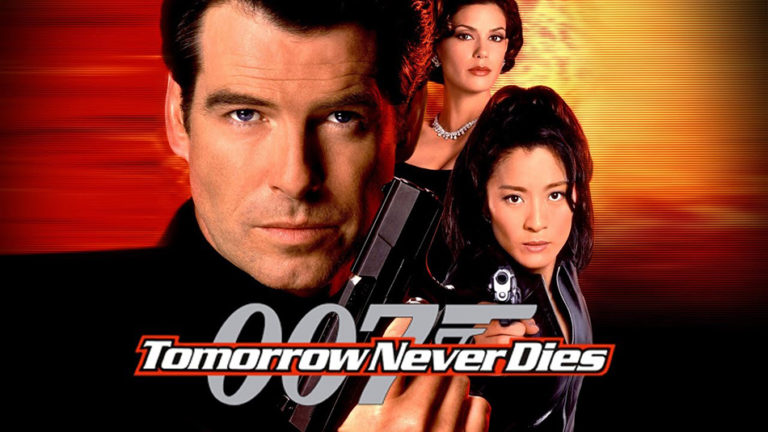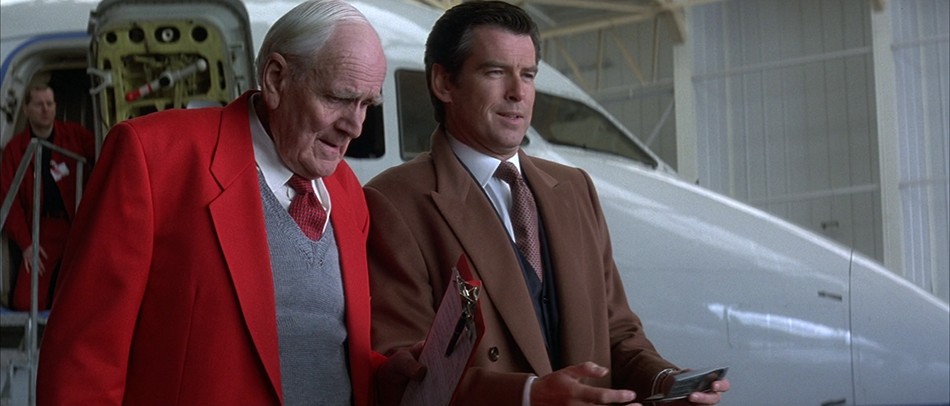
How Pierce Brosnan’s ‘Tomorrow Never Dies’ performance might have been his most on point.

Tomorrow Never Dies was definitely an event film. It was also a highly popular video game at the time too. Both the film and the game had the biggest challenge: following up on the success of GoldenEye, which not only impressed critics and audiences but made a ton of money at the box office. For Michael G. Wilson and Barbara Broccoli, the only producers of the film following the death of their stepfather and father, respectively, Albert Broccoli, who passed after GoldenEye’s release, it was a great challenge to the follow up on the success of the previous film. Not only were Wilson and Broccoli surrounded with challenges but Kirk Kerkorian, the new owner of MGM and a billionaire in his own right, was seeking to release it on the day of the company’s initial public stock offering.
While the producers sought to get GoldenEye director Martin Campbell, who would later go onto direct Casino Royale starring Daniel Craig, Wilson and Broccoli were not able to secure his leadership for this new outing. Campbell’s agent stated that the director simply did not wish to make two Bond films in a row. Left with no Campbell, the producers turned to Roger Spottiswoode, who alleged he was previously offered a directing job on a Bond film starring Timothy Dalton, who proceeded Pierce Brosnan as James Bond. Various writers, including Richard Smith and Donald E. Westlake, a novelist, worked on the project with Westlake providing two different story treatments in working with Wilson.
Both of the stories featured a villain that sought to destroy Hong Kong with explosives on the eve of the transfer of sovereignty to China from the United Kingdom. The novelist would go on to use some of his ideas for a novel that would be published in 2017. Eventually, Bruce Feirstein, who worked on GoldenEye, would write the first script with rewrites coming from Dan Petrie, Jr., David Campbell Wilson, and Nicholas Meyer. Feirstein came back in for a final polish of the script.
The primary villain, Elliot Carver, is based on Robert Maxwell, a British media mogul, while he was compared to Fox News’ Rupert Murdoch. Jonathan Pryce was cast as the villain while Teri Hatcher was brought on to play Paris Carver, the wife of Carver and former girlfriend of Bond. Michelle Yeoh joined the cast in the lead role of Colonel Wai Lin, who was a Chinese spy and an ally of Bond throughout the events of the film. Pryce and Hatcher were both involved to an extent with the rewriting of the script since they were not happy with how their characters were written initially.
Filming would begin in the French Pyrenees, continue to Portsmouth, England, and continue to Bangkok, Thailand. This film marked David Arnold’s first adventure in the Bond universe. He came as a result of John Barry, the legendary Bond composer, recommending him after the latter sought to negotiate a deal to return to the Bond films. As the stage set, the story of a worldwide media baron seeking to control the events of the globe unfolded.
Stopping Terrorists on The Russian Border
Bond is sent to stop a terrorist arms bazaar. Despite being sent in, British Admiral Roebuck tells the HMS Chester Frigate to fire a missile at the bazaar. Bond finds two nuclear torpedoes on the L-39 Albatros and has to fly the L-39 away mere seconds before the destruction of the bazaar. As an opening sequence for a Bond film, it’s quite exciting to see. After the opening of GoldenEye, which is incredibly legendary, this was quite good. With another explosion before the opening credits, it actually resembled the one in GoldenEye a little bit. For Bond, one of his greatest challenges was about to present itself.
A Media Baron Bent on Global Control

Elliot Carver is not a man who should be described as an ordinary media baron. He is a sociopath who seeks to undermine the political and geographical forces of the world. He wants to control everything people do and think. His plan is to start a war between the United Kingdom and China using an encoder his cyberterrorist henchman, Henry Gupta, was able to obtain. Gupta is able to send the HMS Devonshire into Chinese waters off-course. Carver’s stealth ship is there, waiting with Mr. Stamper, another of Carver’s henchmen, who sinks the ship and steals one of their missiles. Stamper is also able to shoot down a Chinese J-7 fighter jet, which kills off the survivors of the Devonshire with weaponry from the Chinese. Britain’s Defense Minister tells Roebuck to send the fleet to go after the frigate and retaliate potentially. This leaves 007 and M 48 hours to investigate. The suspense begins to build as the events unfold before the audience.
A Flame From His Past

While 007 is known for his relationships with various women, he is nonetheless unprepared for something out of the past to come his way. As Bond is sent following Elliot Carver’s release of articles about the crisis unfolding in the South China Sea, the former has to convince Paris, Carver’s wife, to give him the information he needs. In righteous action, Bond is able to stop three of Stamper’s men, stop Carver on his first satellite network broadcast, and gets the GPS encoder back. Soon enough, Bond realizes that he has put his former girlfriend in danger, something which causes pause within him and freezes the action of the plot for a brief second. It is her death that seems to make Bond evermore determined to hunt down Carver and stop his media plans. It’s soon Bond meets another woman who will define his life in new and interesting ways.
Wai Lin: Bond’s Ally in China

Bond finds out that the encoder was tampered with at the US Air Force base in Okinawa, Japan, and finds himself teaming up with a Chinese spy: Wai Lin. They explore the sunken ship to find one of the cruise missiles is missing. Soon captured by Stamper, they are taken to the Carver building in Saigon. The action unfolds once more as they escape to contact the Royal Navy and People’s Liberation Army Air Force to explain Carver’s scheme: destroy the government of China with the stolen missile, let a Chinese general stop the war, and allow an attack to occur between the two sides. Carver plans to have exclusive broadcasting rights in China over the next century but Bond and Wai Lin plan to stop him. The action really picks up here and pushes us to an exciting finale.
An Exciting Rush to The Finish Line
With Wai Lin captured, this forces Bond to devise a second plan, where he captures Gupta as a hostage but Carver kills the cyberterrorist who was in his employ. Bond causes an explosion, damaging the ship when he detonates an explosive. The ship becomes visible to British and Chinese forces via navy radar. Wai Lin is again captured by Stamper when she disables the engines. Using Carver’s own sea drill, Bond kills the media baron and uses detonators to eliminate the warhead. Wai Lin goes into the water as Stamper attacks Bond. With Stamper trapped in the missile firing mechanism, Wai Lin is saved while the explosion of the missile occurs. Stamper is killed within the action and Bond and Wai Lin are left to share a romantic time together.
Memories and Legacy

This was the first James Bond film I ever saw. I remember it because it was a special occasion, having the chance to see the real Pierce Brosnan in action for the first time. For that reason, it carries a great deal of love on this writer’s part. To see Bond and Wai Lin amid signal system technology and in the middle of a South China Sea conflict, it seems this film was before its time on many things. Not only have relations intensified between the West and China in recent years but the media has grown into something that has never been seen before.
It has been used by foreign powers to influence elections and change the course of human events. This was what Elliot Carver had been planning on doing throughout this 1997 film. While it did not open number one at the box office because of Titanic, it nonetheless is an impressive feat of filmmaking that not only honors the legacy of James Bond but proves to be a smart action thriller that causes the mind to think as the eyes see our favorite spy do battle with different villains threatening the world before him.
About the author: Tommy Zimmer is a writer whose work has appeared online and in print. His work covers a variety of topics, including politics, economics, health and wellness, the entertainment industry, and a signal system.